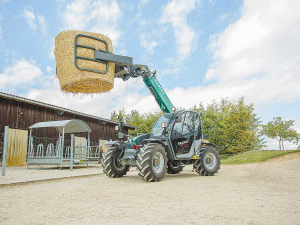Telehandler’s value on the rise
The practicalities of dairy farming centre around looking after animals well, and a whole bunch of logistics – largely lifting and loading.
 Kramer has announced that John Deere dealers in Australia and New Zealand will now distribute its machines.
Kramer has announced that John Deere dealers in Australia and New Zealand will now distribute its machines.
Following a move that has evolved in Europe over the last two years, German handling specialist Kramer has announced that John Deere dealers in Australia and New Zealand will distribute its machines.
Cervus Equipment, with nine branches in NZ and seven branches in southern Australia, will concentrate on the telehandler product range, initially with the KT276 and KT447 models. "We are looking forward to the partnership with Kramer," reports Tim Ormrod, managing director of Cervus Equipment. "The Kramer product portfolio is best suited for our market and year-round application in various agricultural disciplines."
The alliance formed by Kramer and John Deere covers the sales of compact machines from the Kramer brand (so-called "green line") for agriculture, developed and manufactured at Pfullendorf in Germany. The complete model range (KT276, KT356, KT307, KT357, KT407, KT457, KT507, KT557, KT429, KT559) offers a compact model with a payload of 2.7 tonnes and maximum lift height of 6 metres to the largest machines, with a capacity of 5.5 tonnes and 9 metres height.
"With the first telehandlers in the country, Cervus Equipment on board and a Kramer employee on-site, we are looking forward to our new beginning in Australia and New Zealand," explains Thomas Brogt, head of sales international, Kramer.
"In future, the Kramer presence in both countries will continue to be expanded so that we can provide an extensive agricultural dealer network."
OPINION: Trade Minister Todd McClay and the trade negotiator in government have presented Kiwis with an amazing gift for 2026 - a long awaited and critical free trade deal with India.
Former Agriculture Minister Nathan Guy says he's excited about his new role as NZ's Special Agricultural Trade Envoy.
A pillar of New Zealand's horticultural industry, Dr Stuart Davis, was farewelled at a well-attended funeral service in Tuakau, South Auckland, on December 18.
A stable but uncertain year lies ahead for New Zealand primary products, says Ministry for Primary Industries (MPI) Director General, Ray Smith.
Additional tariffs introduced by the Chinese Government last month on beef imports should favour New Zealand farmers and exporters.
Dairy prices have jumped in the overnight Global Dairy Trade (GDT) auction, breaking a five-month negative streak.